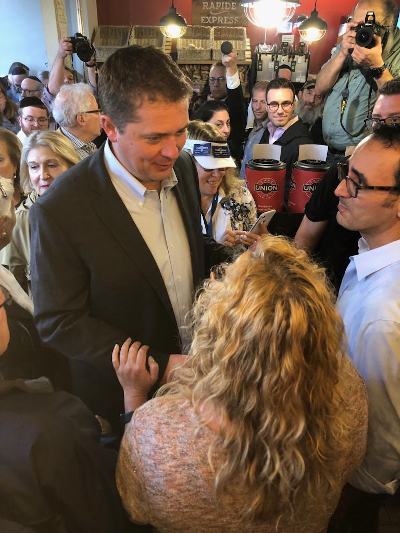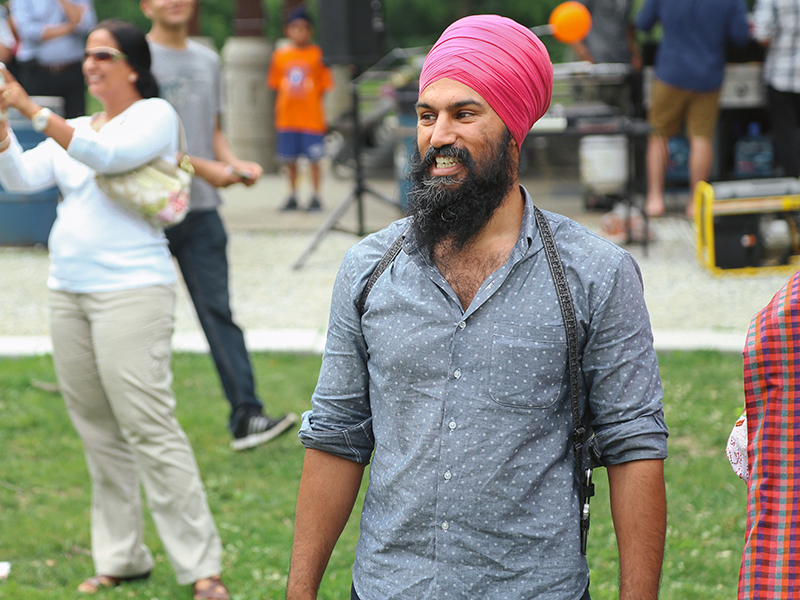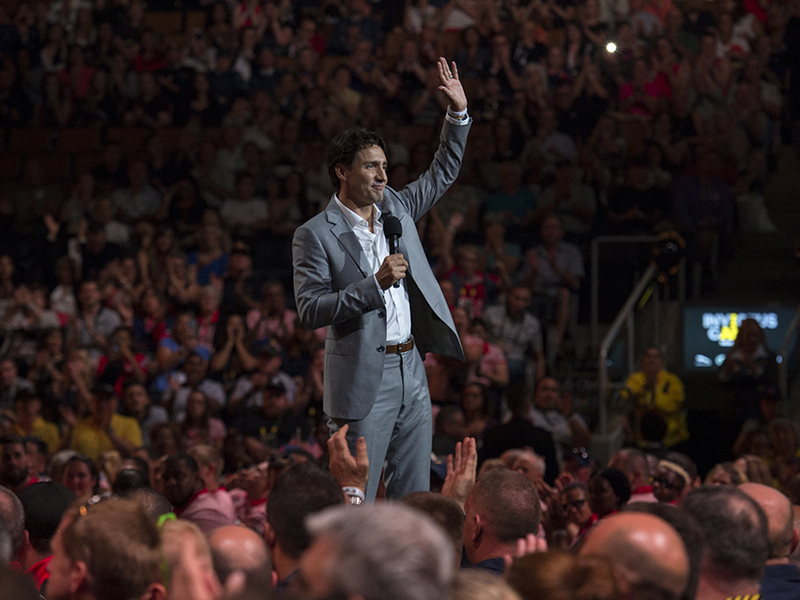Liberal Leader Justin Trudeau finally got the attention of Montreal Jewish voters with his most forthright comments to date on Quebec’s secularism law, during the Oct. 7 English-language debate.
The campaign had up to that point held little drama for the Quebec Jewish community, as ridings with a significant Jewish population are virtually certain to remain Liberal.
In contrast to his subdued response to a question about Bill 21 at the unofficial French-language debate a week earlier, Trudeau boasted: “I am the only one on the stage who said yes, a federal government might have to intervene on this.”

Trudeau also took NDP Leader Jagmeet Singh to task for his “surprising” stance not to intervene, despite the personal hurt he felt.
Bloc Québécois Leader Yves-François Blanchet was adamant that “70 per cent of Quebecers” support the bill.
Yet Trudeau was unfazed: “It’s a question of yes, it’s awkward politically, because as Mr. Blanchet says it is very popular.… So why not act on your convictions and leave the door open to challenging it?”
Afterward, Trudeau reverted to the metaphor of “not closing the door” on intervening, rather than leaving “the door open” – a subtle but telling distinction. Singh, realizing he had been scored off of, later raised the possibility of the federal government being party to a challenge if it reached the Supreme Court.
Whether the exchange will influence how Quebec Jews vote is debatable. Bill 21 has not been a ballot-box issue among Montreal Jewish voters, who overwhelmingly oppose the legislation but put little faith in the federal government’s willingness to do anything about it.
With former prime minister Stephen Harper gone, fewer supporters of Israel feel a debt to the Conservative party, despite leader Andrew Scheer’s promise to move the embassy to Jerusalem.
In the riding of Mount Royal, which has the highest proportion of Jews in Quebec (about 30 per cent), Liberal incumbent Anthony Housefather’s closest challenger is Conservative David Tordjman, an engineer, Côte-St-Luc councillor and an observant kippah-wearing Jew who’s in the uncomfortable position of defending Scheer’s refusal to meddle in the Quebec legislation.

The two front runners have tussled over who is the most effective supporter of Israel and the biggest opponent of anti-Semitism.
According to the poll-tracking website 338Canada.com, as of Oct. 7, Mount Royal is “safe” for the Liberals, as are Notre-Dame-de-Grâce–Westmount, Outremont, Pierrefonds–Dollard and St-Laurent.
Held by former NDP leader Tom Mulcair from 2007 until his resignation in 2018, Outremont returned to its longstanding Liberal allegiance when lawyer Rachel Bendayan was elected in a byelection in February.
The re-election of another Jewish MP, Liberal David Graham in Laurentides–Labelle, is not a sure bet, according to 338Canada.com. It’s projecting that the Laurentian riding north of Montreal will “likely” be claimed by the Bloc.
There are at least two other Jewish Conservative candidates: lawyer Neil Drabkin in NDG–Westmount and Richard Serour in St-Laurent.
The election day conflict with the Jewish holiday of Shemini Atzeret has not been the cause of much consternation because of Elections Canada’s expanded advance voting opportunities.
The federal authority has been much more accommodating than Elections Québec, which failed to take adequate measures a year ago, when the provincial election took place on Shemini Atzeret, as well.

For example, Elections Canada set up a special all-day kiosk at Congregation Shaar Hashomayim on Oct. 7. And in Outremont, home of a large number of Hasidic and other haredi Jews, Bendayan convinced Elections Canada to open two extra places to cast ballots from Oct. 2-4, on de Vimy and Park avenues, which are much closer to where most observant Jews live than the permanent elections office on Côte-des-Neiges Road.
The campaign has been marked by the exposure of alleged anti-Israel conduct by certain candidates. B’nai Brith Canada’s call for the firing of Liberal candidate Hassan Guillet in the Liberal stronghold of St-Léonard-St-Michel resulted in the party dropping him. He is now running as an independent.
B’nai Brith was not successful in getting the NDP to oust Miranda Gallo, who can be seen affixing pro-BDS stickers onto Israeli products at a grocery store in a YouTube video, in the riding of St-Laurent.
Likewise, the Conservatives went after Sameer Zuberi in the riding of Pierrefonds–Dollard for his “anti-Semitic past,” when he was a student union leader at Concordia University in the early 2000s, but the Liberal party stood by him.
Unlike Gallo or NDP candidate and BDS activist Zahia El-Masri in Ahuntsic-Cartierville, Zuberi is almost certainly going to win.

Another NDP newcomer with BDS sympathies may have a chance, as well. Nima Machouf, a member of the pro-BDS Québec Solidaire and wife of its former co-spokesperson Amir Khadir, is running in Laurier-Ste-Marie, which has been held by the NDP since 201l. Projections done by 338Canada.com have the riding “leaning” towards the Liberals.
In Pierrefonds–Dollard, Conservative candidate Mariam Ishak has been the target of pernicious vandalism. It began with swastikas on her signs and escalated to unmistakably anti-Semitic drawings of a caricatured Jewish man and a map of Canada crossed out and replaced with “Israel.”
Ishak, who is a Christian of Egyptian origin, calls it “a clear message of hate.”

More recently, anti-Israel posters sponsored by BDS-Québec began appearing in downtown Montreal. They read, in French, “Our question to political parties: When will there be sanctions against Israel?”
One has a photo of an apparent Israeli soldier pressing a heavy weapon against a frightened youth; another quotes British rock musician Roger Waters urging a boycott of “Israeli apartheid.”
In the 2015 election, BDS-Québec plastered the city with graphic posters of a dead child that it accused Israel of killing. They were taken down by the City of Montreal, but the commissioner of Canada elections later ruled that the group was a registered third party with the right to advertise and that the posters did not violate the Canada Elections Act.
Last year, a Quebec Superior Court judge ordered the city to pay damages to BDS-Québec and the Communist Party.
